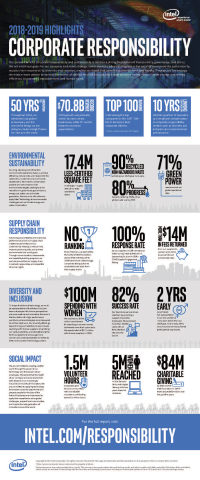The following is an opinion editorial by Suzanne Fallender of Intel
Corporation:
This press release features multimedia. View the full release here:
https://www.businesswire.com/news/home/20190516005108/en/

Intel Corporation released its 2018-19 Corporate Social Responsibility Report on Thursday, May 16, 2019. (Credit: Intel Corporation)
In the two decades that Intel has been releasing environmental and
corporate social responsibility (CSR) reports, the CSR reporting
landscape has changed dramatically. Once a topic reserved for
specialists, today 85% of S&P 500 companies1 regularly
publish CSR reports and many reporters cover CSR for major media
organizations.
Today, Intel released its latest CSR report, highlighting the progress
made over the past year toward our 2020 goals. But do these reports
really matter?
Intel’s Corporate Responsibility Report: Highlights
(Fact Sheet) | Full
Report (Intel.com)
We at Intel think they do – more than ever, in fact – because of how
important they are to our stakeholders, including investors, customers
and employees. These groups demand more accountability than ever, and
companies have an obligation to be transparent with them.
Investors
Investors are increasingly focused on environmental, social and
governance (ESG) issues. From 2016 to 2018, sustainable investment
assets – including portfolios screened for ESG issues, investors
integrating ESG factors into their investment and/or engaging in
shareholder advocacy activities – grew 38 percent in the U.S. As of
2018, such assets totaled $12 trillion, accounting for $1 of every $4
under professional management.2 This increase is largely
driven by mainstream investors integrating ESG issues into their
strategies.
At Intel, we have expanded our year-round outreach to investors on ESG
issues to obtain regular feedback on our reporting and performance. In
response, we aligned our reporting to new external frameworks used most
by investors, further increased integration across our annual
report/10-K, proxy statement and corporate responsibility report and
expanded disclosure on how our approach affects our financial results.
For example, since 2012 we have invested more than $200 million in
energy conservation projects in our global operations, resulting in more
than 4 billion kilowatt-hours conserved and approximately $500 million
saved through the end of 2018.
Customers
More companies are driving responsibility programs throughout their
global supply chains and looking for improved data to help them evaluate
supplier performance. Intel’s major customers are other large global
companies that have their own commitments to corporate responsibility
and sustainability, including formal supplier expectations. Our report
helps them quantify their indirect environmental footprint and better
understand how possible labor risks are assessed in the extended supply
chain. We earned a leadership score in CDP’s
2018 Supplier Engagement Rating for our work to encourage improved
climate and water reporting by our suppliers. We also made significant
progress toward our goal to restore 100 percent of our global water use
by 2025, and we’re on track to achieve our 2020 water-use reduction
goal. Also, as a result of our work to prevent forced and bonded labor
in our supply chain, our suppliers have returned over $14 million in
fees to workers since 2014.
Employees
Research indicates that an employer’s corporate responsibility
reputation and programs are often very important to employees. Intel’s
success depends on our ability to attract and retain top talent by
making Intel an employer of choice and fostering a strong and inclusive
culture. In 2018, we reached full representation in our U.S. workforce,
two years ahead of our original goal. And in early 2019, Intel achieved
global gender pay equity. Eighty-five percent of our employees surveyed
reported that Intel’s corporate responsibility efforts contribute to
their pride in the company. And our employees are more involved in their
communities than ever, with 68,000 employees volunteering 1.5 million
hours last year.
For CSR reporting to serve our investors, customers and employees well,
we must get the right data to the right audiences at the right time.
This requires use of technology to enable real-time data collection,
insights and reporting, and it requires processes such as independent
report assurance, to improve data quality, reliability and
comparability. It requires further integration with financial reporting
teams to ensure alignment to the business and relevance to investors.
And, most importantly, it requires ongoing conversations with
stakeholders as their needs evolve.
Intel’s leaders believe in the value of transparency to our key
stakeholders, and these reports are a critical part of that
transparency. As we work toward our next generation of corporate
responsibility and sustainability goals, we will continue to work to
make our CSR reporting better, timelier and more useful, and we hope
that others companies do the same.
Suzanne Fallender is director of Corporate Responsibility at Intel
Corporation.
About Intel
Intel (NASDAQ: INTC), a leader in the semiconductor industry, is shaping
the data-centric future with computing and communications technology
that is the foundation of the world’s innovations. The company’s
engineering expertise is helping address the world’s greatest challenges
as well as helping secure, power and connect billions of devices and the
infrastructure of the smart, connected world – from the cloud to the
network to the edge and everything in between. Find more information
about Intel at newsroom.intel.com
and intel.com.
1 Governance and Accountability Institute
2
US SIF Foundation, Report
on U.S. Sustainable, Responsible, and Impact Investing Trends 2018.
Intel and the Intel logo are trademarks of Intel Corporation in the
United States and other countries.
View source version on businesswire.com: https://www.businesswire.com/news/home/20190516005108/en/
